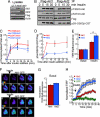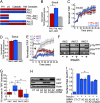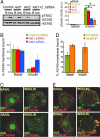Insulin-modulated Akt subcellular localization determines Akt isoform-specific signaling
- PMID: 19372382
- PMCID: PMC2678468
- DOI: 10.1073/pnas.0901933106
Insulin-modulated Akt subcellular localization determines Akt isoform-specific signaling
Abstract
The 3 Akt protein kinase isoforms have critical and distinct functions in the regulation of metabolism, cell growth, and apoptosis, yet the mechanisms by which their signaling specificity is achieved remain largely unclear. Here, we investigated potential mechanisms underlying Akt isoform functional specificity by using Akt2-specific regulation of glucose transport in insulin-stimulated adipocytes as a model system. We found that insulin activates both Akt1 and Akt2 in adipocytes, but differentially regulates the subcellular distribution of these Akt isoforms. The greater accumulation of Akt2 at the plasma membrane (PM) of insulin-stimulated adipocytes correlates with Akt2-specific regulation of the trafficking of the GLUT4 glucose transporter. Consistent with this pattern, Akt constructs that do not accumulate at the PM to the same degree as Akt2 fail to regulate GLUT4 translocation to the PM, whereas enhancement of Akt1 PM association through mutation in Akt1 PH domain is sufficient to overcome Akt-isoform specificity in GLUT4 regulation. Indeed, we found that this distinct insulin-induced PM accumulation of Akt kinases is translated into a differential regulation by the Akt isoforms of AS160, a RabGAP that regulates GLUT4 trafficking. Our data show that Akt2 specifically regulates AS160 phosphorylation and membrane association providing molecular basis for Akt2 specificity in the modulation of GLUT4 trafficking. Together, our findings reveal the stimulus-induced subcellular compartmentalization of Akt kinases as a mechanism contributing to specify Akt isoform functions.
Conflict of interest statement
The authors declare no conflict of interest.
Figures




Similar articles
-
Development of a new model system to dissect isoform specific Akt signalling in adipocytes.Biochem J. 2015 Jun 15;468(3):425-34. doi: 10.1042/BJ20150191. Epub 2015 Apr 9. Biochem J. 2015. PMID: 25856301 Free PMC article.
-
The glucose transporter 4 FQQI motif is necessary for Akt substrate of 160-kilodalton-dependent plasma membrane translocation but not Golgi-localized (gamma)-ear-containing Arf-binding protein-dependent entry into the insulin-responsive storage compartment.Mol Endocrinol. 2007 Dec;21(12):3087-99. doi: 10.1210/me.2006-0476. Epub 2007 Aug 30. Mol Endocrinol. 2007. PMID: 17761952
-
C2 domain-containing phosphoprotein CDP138 regulates GLUT4 insertion into the plasma membrane.Cell Metab. 2011 Sep 7;14(3):378-89. doi: 10.1016/j.cmet.2011.06.015. Cell Metab. 2011. PMID: 21907143 Free PMC article.
-
Role of Akt substrate of 160 kDa in insulin-stimulated and contraction-stimulated glucose transport.Appl Physiol Nutr Metab. 2007 Jun;32(3):557-66. doi: 10.1139/H07-026. Appl Physiol Nutr Metab. 2007. PMID: 17510697 Review.
-
AKT ISOFORMS-AS160-GLUT4: The defining axis of insulin resistance.Rev Endocr Metab Disord. 2021 Dec;22(4):973-986. doi: 10.1007/s11154-021-09652-2. Epub 2021 Apr 30. Rev Endocr Metab Disord. 2021. PMID: 33928491 Review.
Cited by
-
Heterogeneous kinetics of AKT signaling in individual cells are accounted for by variable protein concentration.Front Physiol. 2012 Nov 28;3:451. doi: 10.3389/fphys.2012.00451. eCollection 2012. Front Physiol. 2012. PMID: 23226133 Free PMC article.
-
Resistance training boosts lactate transporters and synaptic proteins in insulin-resistance mice.Heliyon. 2024 Jul 14;10(14):e34425. doi: 10.1016/j.heliyon.2024.e34425. eCollection 2024 Jul 30. Heliyon. 2024. PMID: 39082040 Free PMC article.
-
Specialized sorting of GLUT4 and its recruitment to the cell surface are independently regulated by distinct Rabs.Mol Biol Cell. 2013 Aug;24(16):2544-57. doi: 10.1091/mbc.E13-02-0103. Epub 2013 Jun 26. Mol Biol Cell. 2013. PMID: 23804653 Free PMC article.
-
Crosstalk in transition: the translocation of Akt.J Math Biol. 2019 Mar;78(4):919-942. doi: 10.1007/s00285-018-1297-8. Epub 2018 Oct 9. J Math Biol. 2019. PMID: 30306249
-
Metabolic syndrome diminishes insulin-induced Akt activation and causes a redistribution of Akt-interacting proteins in cardiomyocytes.PLoS One. 2020 Jan 29;15(1):e0228115. doi: 10.1371/journal.pone.0228115. eCollection 2020. PLoS One. 2020. PMID: 31995605 Free PMC article.
References
-
- Woodgett JR. Recent advances in the protein kinase B signaling pathway. Curr Opin CellBiol. 2005;17:150–157. - PubMed
-
- Dummler B, Hemmings BA. Physiological roles of PKB/Akt isoforms in development and disease. Biochem Soc Trans. 2007;35(Pt 2):231–235. - PubMed
-
- Whiteman EL, Cho H, Birnbaum MJ. Role of Akt/protein kinase B in metabolism. Trends Endocrinol Metab. 2002;13:444–451. - PubMed
-
- Cho H, et al. Insulin resistance and a diabetes mellitus-like syndrome in mice lacking the protein kinase Akt2 (PKB beta) Science. 2001;292:1728–1731. - PubMed
Publication types
MeSH terms
Substances
Grants and funding
LinkOut - more resources
Full Text Sources
Medical
Molecular Biology Databases
Miscellaneous

